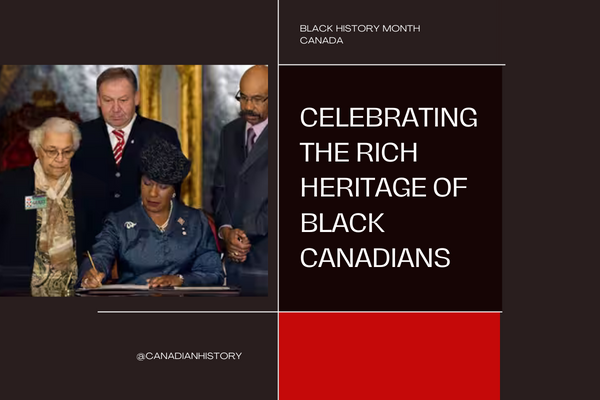
Black History Month in Canada is a time to reflect on the rich and diverse contributions of Black Canadians throughout history. Recognized annually in February, this month serves as a platform to celebrate achievements. It honours and raises awareness about the challenges the black community faces. Celebrating Black History Month provides an opportunity to explore Canada’s history and the crucial role that black Canadians, and newcomers, play in shaping the country.
Black History Month in Canada is a time to celebrate the contributions and rich cultural heritage of the black community. It is a time to acknowledge the community’s struggles and recognize the individuals who have played vital roles in Canadian history. Black Canadians have left a permanent mark on the nation’s development. However, their stories and struggles have often not received the attention they deserve.
Historical Background of Black History in Canada
The Black Loyalists, who arrived in Nova Scotia after the American Revolutionary War, trace their presence in Canada back to that historical period. As a consequence of the American Revolutionary War, the British granted freedom to thousands of black individuals who had sided with them. These individuals thereafter settled in Nova Scotia. An estimated number of 30,000 to 40,000 black slaves arrived in British North America (now Canada). This was the largest anti-slavery freedom movement in North America which provided a safe place for escaped slaves. This migration laid the establishment of a vibrant black community in Canada, contributing to Canada’s multiculturalism.
Origins of Black History Month
The origins of Black History Month in Canada are due to the efforts of black educators, activists, and community leaders who sought to address the lack of representation and recognition of black history in the country. In the 1950s and 1960s, the civil rights movement in the United States inspired similar calls for black community rights and recognition in Canada.
Black History Month is Born
Advertisement:
In 1995, the House of Commons officially recognized February as Black History Month. Subsequently, Honourable Jean Augustine, the first black Canadian woman elected to Parliament, introduced the motion. This milestone marked a significant step toward acknowledging and celebrating the contributions of Black Canadians throughout history.
Canada’s House of Commons voted to officially designate the 1st of August as Emancipation Day. This day marks the actual day of the abolition of slavery in the British Empire in 1834, including in Canada.

Other Posts:
Settling in Canada with Confidence and Ease
Is Family Day a Statutory Holiday in Canada?
National Day for Truth & Reconciliation is Sept 30
Advertisement:
Viola Desmond took a stand in 1946 which left a lasting mark on the struggle against racial segregation. Her refusal to accept discrimination in a Nova Scotia movie theatre contributed to the dismantling of segregation laws in Canada. Her refusal to sit in a segregated area of the Roseland Theatre in New Glasgow, Nova Scotia, opened the door for a more inclusive society. Desmond was jailed and fined for her refusal. Desmond died in 1946. However, in 2010, the government of Nova Scotia posthumously pardoned Desmond and apologized to her family.
While Canada has a long-held value for diversity, it’s vital to remember the brave acts of black Canadians such as Viola Desmond to help us achieve equality.

Political Milestones
Political milestones also mark the trajectory of black Canadian history. Notably, Lincoln Alexander was elected the first black Member of Parliament in 1968. He was later also appointed the first black Lieutenant Governor of Ontario (1985-1991) and shattered racial barriers for greater diversity and representation in Canadian politics.
The Congress of Black Women of Canada (CBWC) which was established in 1973 was dedicated to improving the lives of all black women and their families. This organization played a crucial role in advocating for social justice, equality, and the recognition of black women’s contributions to Canadian society.
To learn more about the history of Canadian Black History Month, click here.
Activities in Black History Month in Canada
Schools, universities, and educational institutions organize special programs and workshops focused on Black history. Through these events, they aim to educate students and the broader community about the significant contributions of Black Canadians, historical milestones, and the ongoing fight for social justice. Additionally, these initiatives foster a deeper understanding of the rich cultural heritage and challenges faced by the Black community. Overall, such educational efforts play a crucial role in promoting inclusivity and awareness within society.
Events Hosted by Community Organizations
Community organizations play a crucial role in organizing events that celebrate black history and culture. These can include discussions, lectures, and forums addressing issues such as racial equality, diversity, and inclusion. Community centers may host events that showcase the talents of local black artists, musicians, and performers.
Galleries and museums often feature exhibitions highlighting the works of black artists, photographers, and sculptors. These exhibitions provide a platform to explore the diverse expressions of black culture. Cultural performances, including music, dance, and theatre productions, are organized to showcase the richness and diversity of black artistic expression.
Historical Tours
Historical tours may be organized to highlight significant sites related to Black Canadian history. This can include places associated with the Underground Railroad, historic neighbourhoods, or landmarks connected to prominent black figures. Initiatives may focus on supporting black-owned businesses and promoting economic empowerment within the black community.
Government-led Events
For recognizing Black History Month, Government-led events, ceremonies, and official announcements may take place to highlight the importance of celebrating black heritage. They use Social media platforms to share information, stories, and resources related to black history and culture. Hashtags and online campaigns contribute to a broader, national conversation about Black Canadian identity.
Celebrating Black History Month
Black History Month offers an opportunity to shine a spotlight on the achievements of Black Canadians. Moreover, communities across the country organize events, educational programs, and cultural celebrations. These initiatives aim to showcase the contributions of black individuals in various fields.
These celebrations promote understanding, inclusivity, and unity among all Canadians. Black History Month celebrations in Canada are diverse and vibrant, reflecting the richness of Black Canadian history, culture, and contributions. Throughout February, various events, activities, and initiatives take place across the country to commemorate and celebrate black heritage.
The celebrations during Black History Month in Canada aim to honour the past and foster a deeper understanding of the contributions of Black Canadians. By doing so, Canada promotes inclusivity and social justice in the present and future.
The Significance of Celebrating Black History Month in Canada
Black History Month is not only about remembering the past but also about visualizing a more equitable future. By acknowledging the contributions of Black Canadians, Canadians work together to build a society that values diversity and respects the dignity of every individual.
Black History Month in Canada serves as a reminder to honour the past, celebrate achievements, and work towards a future that embraces diversity and equality. Canadians can collectively contribute to a more inclusive and harmonious society.

My name is Zain Usmani and I am a freelance content writer who currently resides in Mississauga, Ontario. I immigrated from Pakistan to Canada 5 years ago and have lived in many cities ever since. I have lived in Calgary AB, Edmonton AB, Regina SK, London ON, and Mississauga ON, while visiting over 40 Canadian cities and towns. I have a great passion for writing and I love helping people through it.

